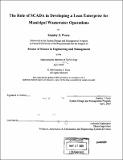The role of SCADA in developing a lean enterprise for municipal wastewater operations
Author(s)
Prutz, Stanley J
DownloadFull printable version (18.26Mb)
Alternative title
Role of supervisory control and data acquisition in developing a lean enterprise for municipal wastewater operations
Other Contributors
System Design and Management Program.
Advisor
Deborah Nightingale.
Terms of use
Metadata
Show full item recordAbstract
Central to optimizing a wastewater system's operations is the collection of alarm and operational data from various remote locations throughout a municipality, hence the basic need for supervisory control and data acquisition (SCADA). The process of providing SCADA systems to municipal clients, from conception to implementation, is typically a cumbersome process involving a wide variety of stakeholders. Municipalities have historically been slow to change, often being among the last in adopting new processes and technologies. Municipal SCADA systems usually are deployed without considering how they will specifically create value for municipality end-users and without defining metrics to gauge their effectiveness. Lean enterprise principals suggest a focus on the value stream can reduce waste and improve the value municipality end-users derive from SCADA systems. The author performs a lean analysis of the process of implementing SCADA within a municipal wastewater operation. The municipality's current systems integrator-centric model for SCADA delivery is examined. An alternate lean vision is proposed for the integrator's operations and their relationship with the municipality. This vision reduces SCADA implementation time and costs while improving the effectiveness of the SCADA solution.
Description
Thesis (S.M.)--Massachusetts Institute of Technology, System Design and Management Program, 2005. Includes bibliographical references (p. 115-116).
Date issued
2005Department
System Design and Management Program.Publisher
Massachusetts Institute of Technology
Keywords
System Design and Management Program.